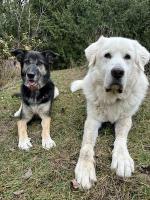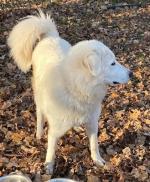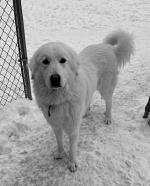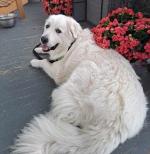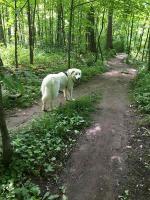Ready to commit
by Peter Stager
(Maryland USA)
OK so I have done my research and I am now sure I am ready for my great Pyrenees. I have had other large breeds and I know I will provide a good home. Because of all I read I have decided I want to try to rescue one. So now I would like to as how do I go about finding a great Pyrenees from rescue? I think I want a male what is the biggest difference between sexes. Can anyone recommend a good rescue in the Maryland area.I have a nice size fenced in yard, all the people around all have barking dogs and I will have a doggie door. But he will be and inside dog with outside privlages. Any advice is welcome. I have sons 14 and 16. My wife is excited to have a big fluffy family guardian.
Comments for Ready to commit
|
||
|
||
|
||
|
||
|
||
|
||
|
||
Breaking News
-
Courtesy - Bear
Apr 09, 25 09:09 AM
Bear DOB: October 2018 Location: Midland, Ontario Pyr/Maremma? mix Single family home with a large securely-fenced property or a hobby farm. Purchased/adopted -
Courtesy Post - Willow
Apr 09, 25 09:07 AM
DOB: March 26th, 2022 Location: London Ontario Cross Pyr/Collie Obtained her privately through a friend. How long have you had her? 10 months Spayed -
Lucy
Apr 09, 25 09:06 AM
*Foster-to-Adopt* or *Foster* DOB: January 3, 2024 Location: Acton, Ontario She will need a single-family home with a securely fenced yard of at least -
Remi
Apr 09, 25 07:44 AM
Location: Acton, Ontario DOB: February 2024 This sweet white fluffy Remi has a sad story. Remi, while his family was in the midst of moving, escaped and -
Grieving Dog
Apr 04, 25 06:17 PM
Background: I am seeking some feedback if anyone has had experience with bonded pairs. Thank you! We have been fortunate to love 2 x almost 10 year -
Leo
Mar 12, 25 06:32 AM
*ADOPTED* DOB: September 2023 (almost 1.5-years-old) Location: Acton, ON Single family home with a securely fenced yard required. This sweetheart was -
Buster
Mar 10, 25 03:36 PM
*Buster is going back to his original family as things have brightened up in their lives and he'll have a wonderful life on acreage.* Buster had to come -
Courtesy - Maya
Jan 08, 25 05:35 PM
*ADOPTED* Location: Dunnville, ON DOB: Jan. 3, 2021 (3.5 years) Spayed Companion Dog, Pyr mix Good with children. Single family home. Raw diet (species-appropriate)




